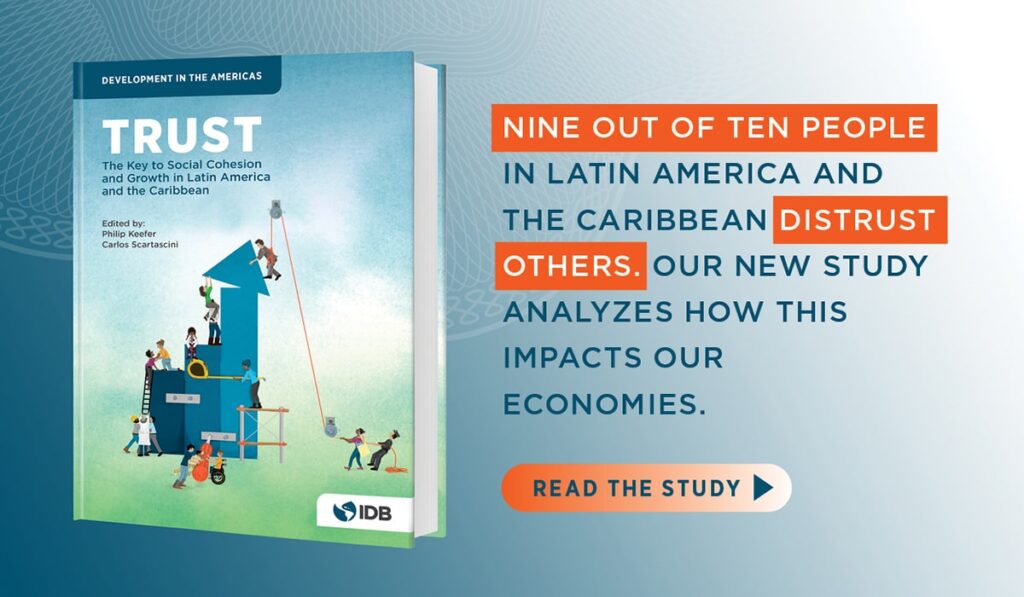The government says it is progressing in its fight against the COVID-19 pandemic, but firms distrust the news, delaying investments and hiring and slowing economic recovery. A firm manager distrusts her own employees and refuses to delegate responsibilities, complicating efforts to invest, innovate and move into new markets. Citizens distrust firms and demand excessive regulation, harming growth.
We tend to think of trust as critical to personal and social relationships, and crucial to our connections with our leaders and government. But it is also essential to healthy business relationships and to the creation of robust economies. In Latin America and the Caribbean, where trust levels are among the lowest around the world, the widespread lack of trust represents a serious drag on productivity and contributes to some of the world’s worst economic growth rates. Reversing that situation, as we indicate in the IDB’s new Development in the Americas report, could not be more important. It is key to helping the region pull out of the economic doldrums of the pandemic and solving a host of other social, political, economic and environmental challenges.
A Lack of Trust in Government
As we document in our report, Trust: The Key to Social Cohesion and Growth in Latin America and the Caribbean, the problems of trust can be seen in virtually every sphere of the economy. Firms that distrust the government, that doubt its policy initiatives in regulatory, fiscal, infrastructure and a host of other economic areas, are unlikely to respond to those initiatives, even when favorable. Similarly, firms that distrust the government’s reports of its progress during a crisis—like the COVID-19 pandemic—are less likely to invest and retain employees. That, in turn, worsens economic outcomes.
Firms that distrust each other, that worry that their suppliers will fail to deliver quality products on time and at the agreed-upon price, must turn to more costly arrangements to do business. For example, they vertically integrate, producing both intermediate goods and final products even though other firms are more efficient producers of one or the other. Or they rely on relational contracts, which use the prospect of future profits from an ongoing business relationship to enforce compliance. In the Costa Rican coffee industry, to cite one of countless examples, 40% of the exchanges between first stage processing mills and exporters are characterized by vertical integration, 40% by relationships of three years or more, and only 20% by relationships of less than three years. Unfortunately, when firms rely on such long-term business arrangements to solve trust problems, consumers pay higher prices as new producers who operate at lower cost and who could drive down prices are excluded.
A Lack of Faith in and Within Firms
Meanwhile, citizens who distrust firms, who worry they will pollute, renege on their obligations to workers or suppliers or misrepresent the quality of their products, tend to demand strict regulations. They demand them even when they also mistrust government. The problem is that stringent requirements to start and scale up businesses hurt innovation and growth. They also favor large firms that can better afford the costs of compliance or that are more adept at evading regulation.
Finally, when trust is high, managers hire the most capable and efficient workers and delegate significant responsibility to them, yielding greater innovation and agility, and facilitating firm growth. In contrast, firm managers who have low levels of interpersonal trust tend to hire old friends and family, preferring them even to the most skilled and talented people in the labor market. They also are reticent to delegate responsibilities within the firm and instead waste their time and expertise on jobs that could be fulfilled by others. All this inhibits firm efficiency, creativity, and productivity.
“The toughest thing about the power of trust is that it’s very difficult to build and very easy to destroy,” said Thomas Watson. As a businessman, the former CEO and chairman of International Business Machines (IBM) might have appreciated the immense challenges Latin America and the Caribbean faces in recovering the trust between individuals, between firms, between individuals and firms, and between everyone and their government so crucial to the economic dynamism that the region needs to innovate and grow.
Reforms to Recover Trust and Boost Economies
Our report is full of recommendations for steps that can be taken at every level to generate that trust. They include, among many others, reforms to increase competition so that the market can penalize firms that display anti-social behavior and generally act in an untrustworthy manner; reforms of courts, regulatory bodies and other third-party enforcement agencies so that market participants have confidence they are operating on a level playing field and don’t have to adopt defensive tactics; and reforms in education and communications to increase citizen literacy and awareness about the private sector, since lack of knowledge breeds suspicion and mistrust.
It will be a long road, perhaps an inter-generational struggle. But trust is the basis of social cohesion and all the personal, economic and political exchanges on which society depends. Without embarking on a determined road to reform, there can be no solution to sluggish productivity, slow growth, high unemployment, fiscal crises, and all the other ailments holding back this region’s immense economic potential.



